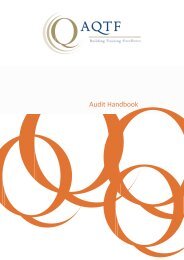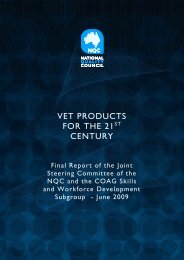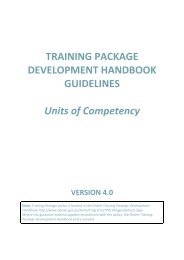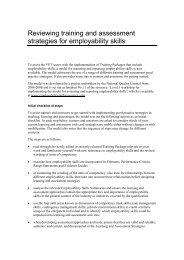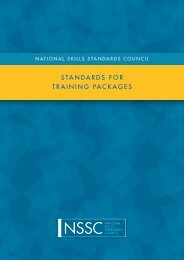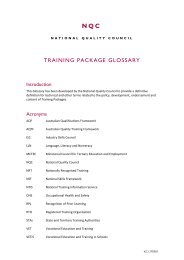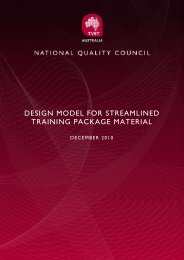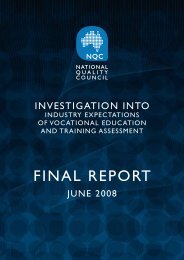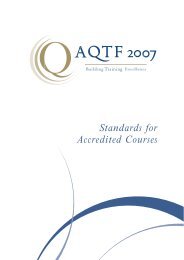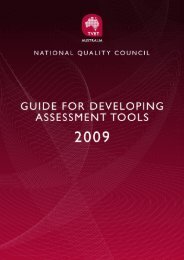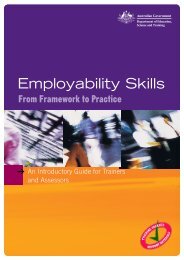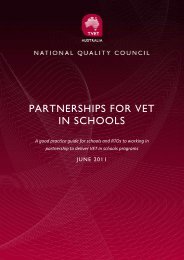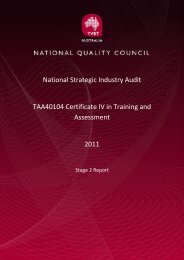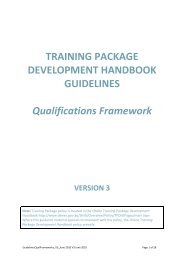Skills for Sustainability Stocktake - National Skills Standards Council
Skills for Sustainability Stocktake - National Skills Standards Council
Skills for Sustainability Stocktake - National Skills Standards Council
Create successful ePaper yourself
Turn your PDF publications into a flip-book with our unique Google optimized e-Paper software.
NQC | <strong>Sustainability</strong> <strong>Skills</strong> <strong>Stocktake</strong> and Gap Analysis
NQC | <strong>Sustainability</strong> <strong>Skills</strong> <strong>Stocktake</strong> and Gap Analysis<br />
<strong>Skills</strong> <strong>for</strong> sustainability <strong>Stocktake</strong> and Gap Analysis: Final report 2
NQC | <strong>Sustainability</strong> <strong>Skills</strong> <strong>Stocktake</strong> and Gap Analysis<br />
Contents<br />
Executive Summary .................................................................................................................................. 4<br />
Recommendations .................................................................................................................................... 6<br />
Introduction................................................................................................................................................ 7<br />
Background ............................................................................................................................................... 7<br />
Methodology ............................................................................................................................................. 7<br />
Existing environmental sustainability coverage in VET .......................................................................... 7<br />
Gaps ........................................................................................................................................................... 9<br />
Further initiatives ...................................................................................................................................... 10<br />
Possible approaches to develop and embed environmental sustainability in VET ......................... 11<br />
Conclusion ............................................................................................................................................... 13<br />
Appendix I – units and qualifications database .................................................................................. 15<br />
Appendix II – accredited courses related to sustainability ................................................................ 26 <br />
Appendix III – respondents to discussion paper and workshop participants ................................... 28 <br />
<strong>Skills</strong> <strong>for</strong> sustainability <strong>Stocktake</strong> and Gap Analysis: Final report 3
NQC | <strong>Sustainability</strong> <strong>Skills</strong> <strong>Stocktake</strong> and Gap Analysis<br />
Executive Summary <br />
Coverage<br />
Gaps<br />
The 2009 Work Plan of the <strong>National</strong> Quality <strong>Council</strong> gave priority to developing flexible and<br />
responsive training products that include embedding sustainability in all training packages,<br />
sustainability skill sets and customised short accredited courses, and development of<br />
appropriate standards as part of the Australian Quality Training Framework (AQTF) <strong>for</strong> voluntary<br />
certification of RTOs as providers of Green <strong>Skills</strong>. The NQC has established the <strong>Skills</strong> <strong>for</strong><br />
<strong>Sustainability</strong> Action Group to progress this work. Precision Consultancy was contracted to<br />
undertake desk research, develop a discussion paper and consult with stakeholders, to<br />
determine:<br />
• existing environmental sustainability coverage in Training Packages, Units of Competency,<br />
VET qualifications, Accredited Courses and Skill Sets<br />
• existing and potential emerging gaps in existing VET products<br />
• possible mechanisms / approaches to further embedding environmental sustainability in<br />
VET products and the implications of the approaches.<br />
Training Packages currently contain several hundred units of competency which have a<br />
primary focus on issues of sustainability across all industry areas. These range from overview<br />
units, such as Participate in environmentally sustainable work practices (AQF2/3 – operator<br />
level found in many training packages), to very specific units, such as Build thermally efficient<br />
and sustainable structures from the Construction and Plumbing Services Training Package. As<br />
well as that, in the last few years we have seen the development of some specific<br />
qualifications <strong>for</strong> new occupational areas, or to meet new skill requirements. The development<br />
of the proposed Certificate IV in Home <strong>Sustainability</strong> Assessment in the Construction and<br />
Property Services industry is just one example of this. Many, if not most, qualifications in training<br />
packages allow <strong>for</strong> at least one elective unit to be imported from outside that qualification<br />
and in many cases from outside the training package. This means that one of the three<br />
generic sustainability skill units is available in most qualifications and in many cases it would be<br />
possible to import one or more of the specific units listed in Appendix I.<br />
A number of courses have been accredited that focus on areas of sustainability skills over the<br />
last few years. These range from very specific, narrowly focussed short courses such as Course<br />
in Electrical Energy Efficiency, or Course in Renewable Energy On Farm – Application through<br />
to whole qualifications in specific areas such as Graduate Vocational Certificate in Energy<br />
Efficient Heating, Ventilation and Air Conditioning Design or qualifications with a broader<br />
focus, such as Certificate IV in Understanding and Negotiating <strong>Sustainability</strong> Issues or the<br />
Diploma of <strong>Sustainability</strong>.<br />
The stocktake of current units, based on currently accredited courses and units proposed by<br />
ISCs as being part of their current training packages can be found in Appendix I. However, this<br />
list is potentially misleading as it under represents what is actually going on; it relates to units<br />
that are specific to particular sustainability issues rather than sustainability approaches which<br />
could be seen as an underpinning skill, or as a specific way of working.<br />
ISCs will no doubt continue to identify the specific sustainability units through their annual<br />
environmental scan processes and through normal training package continuous improvement<br />
processes. Through this process they should be able to identify emerging gaps, in areas where<br />
skills are needed. However a more concerted approach will need to be taken to ensure that<br />
all Training Packages „embed skills <strong>for</strong> sustainability in key competencies or through inclusion of<br />
core sustainability competencies; actively support the timely implementation and uptake of<br />
revised Training Packages‟ as outlined in the draft <strong>National</strong> Green <strong>Skills</strong> Agreement.<br />
This agreement between the Commonwealth of Australia and States and Territories „seeks to<br />
build the capacity of the Vocational Education and Training (VET) sector to deliver the skills <strong>for</strong><br />
sustainability required in the workplace and to enable individuals, businesses and communities<br />
to adjust to and prosper in a sustainable, low carbon economy‟. This Agreement is a statement<br />
of the commitment of the Australian and state and territory governments to work<br />
collaboratively with employer and employee representatives, the VET sector and community<br />
<strong>Skills</strong> <strong>for</strong> sustainability <strong>Stocktake</strong> and Gap Analysis: Final report 4
NQC | <strong>Sustainability</strong> <strong>Skills</strong> <strong>Stocktake</strong> and Gap Analysis<br />
organisations to ensure that training in, and the delivery of, skills <strong>for</strong> sustainability are an integral<br />
part of all vocational education and training and are relevant to the needs of industry. The<br />
Agreement goes on to define sustainability in the following way:<br />
<strong>Skills</strong> <strong>for</strong> sustainability, also known as green skills, are the technical skills, knowledge,<br />
values and attitudes needed in the work<strong>for</strong>ce to develop and support sustainable<br />
social, economic and environmental outcomes in business, industry and the<br />
community.<br />
The Industry <strong>Skills</strong> <strong>Council</strong> in their early 2009 analysis of sustainability skills in training packages<br />
used the following definition:<br />
Environmental sustainability requires the design and provision of products and services<br />
that incorporate and promote waste minimisation and the efficient and effective use<br />
and reuse of resources.<br />
The implications of ISCs using this narrower definition are that the implementation of the<br />
national green skills agreement will lead to the identification of more units of competency<br />
than the work undertaken this year but there will still be gaps that need to be filled.<br />
The development of the specific accredited courses listed in the database (see Appendix I)<br />
indicates some of the gaps in training packages in specific areas. A significant gap which was<br />
raised during the consultations was in the TAA04 Training Package where most respondents<br />
argued that trainers and assessors across industry areas would require new skills to „unpick‟<br />
sustainability skills in units and also to teach sustainable approaches. Another gap is <strong>for</strong> a<br />
broad qualification in sustainability work practices, which could sit in the Business Services<br />
Training Package as a cross industry qualification. There are several broad sustainability<br />
accredited courses but none within training packages.<br />
Approaches to filling gaps and further embedding sustainability<br />
There are several specific options identified in the report which detail examples of approaches<br />
to filling gaps.<br />
• Write new units of competency and or qualifications where required<br />
These will be identified by ISCs as part of their requirements under the national green skills<br />
agreement.<br />
• Enhance existing units of competency<br />
All units of competency which relate to functions which are energy dependent, such as<br />
machinery operation units have the potential to be „sustainability units‟.<br />
• Examine existing units <strong>for</strong> embedded or potential sustainability skills, and enhance those<br />
This could include collaborative work across ISCs to identify opportunities <strong>for</strong> embedding<br />
sustainability skills in quality units, or their work effectively units. As there is significant<br />
commonality between these units across industry areas and across training packages, it would<br />
be efficient to work together to identify key changes and then insert them into the required<br />
units. As many of these units are core in qualifications, changing just a few units in this way will<br />
have significant impact.<br />
• Build resource materials to encourage take up of existing, new and enhanced units<br />
Uptake of current sustainability units is variable, and stakeholders suggest this is partly due to<br />
the absence of suitable resource materials. The WELL program, funded through DEEWR,<br />
provides a model that could be used <strong>for</strong> the development of industry specific resources.<br />
• Provide professional development <strong>for</strong> trainers and assessors.<br />
There was significant support in consultations <strong>for</strong> the development of ongoing professional<br />
development <strong>for</strong> trainings and assessors, particularly to develop the vocational competence<br />
of trainers against new units of competency, but also to develop more general skills in<br />
teaching and assessing sustainability skills. Some work is already underway in relation to the<br />
<strong>Skills</strong> <strong>for</strong> sustainability <strong>Stocktake</strong> and Gap Analysis: Final report 5
NQC | <strong>Sustainability</strong> <strong>Skills</strong> <strong>Stocktake</strong> and Gap Analysis<br />
Training and Assessment Training Package which may enable these skills to be <strong>for</strong>mally<br />
recognised.<br />
Recommendations<br />
1. Provide ISCs with the attached database of units and courses as a starting point in their<br />
work to fully identify current gaps in their Training Packages, in line with requirements of the<br />
proposed <strong>National</strong> Green <strong>Skills</strong> Agreement, and require completion of this work by March<br />
2010. Encourage ISCs to prioritise work functions in their industries which will have the most<br />
impact on a sustainable future, identify related units which are most widely used, and<br />
focus their unit enhancements on these areas.<br />
2. Establish a coordinated approach to the work of ISCs in the above areas to avoid<br />
duplication of ef<strong>for</strong>t and the sharing of best practice through an engagement process with<br />
the NQC which:<br />
(a) Encourages ISCs to share approaches to the identification of gaps, particularly the<br />
opportunities which exist to enhance existing core units, in areas such as quality or<br />
work effectiveness, which will have a wide impact across industries.<br />
(b) Provides the NQC with standardised reports on ISC outcomes<br />
3. In line with other work of the NQC in relation to the implementation of the VET Products of<br />
the 21st Century report, encourage better communication between RCABs and ISCs in<br />
relation to accredited courses which may duplicate work underway to identify<br />
sustainability skill requirements in Training Packages, and encourage the publication of<br />
Crown Copyright Accredited Courses on the NTIS to facilitate this activity.<br />
4. Determine the most effective mix of professional development activities which will raise the<br />
capability of VET trainers and assessors, taking into account the requirements on RTOs<br />
under AQTF to update the vocational competence of their staff, but also by working with<br />
the ISCs in relation to specific areas.<br />
5. Develop resource materials such as training and facilitation guides and learning and<br />
assessment guides <strong>for</strong> sustainability skills in training packages. This should include examining<br />
the DEEWR funded WELL program as a potential model to provide an approach that will<br />
enable industry specific resources to be developed and added to over time.<br />
<strong>Skills</strong> <strong>for</strong> sustainability <strong>Stocktake</strong> and Gap Analysis: Final report 6
NQC | <strong>Sustainability</strong> <strong>Skills</strong> <strong>Stocktake</strong> and Gap Analysis<br />
6.<br />
Introduction<br />
Background<br />
Methodology<br />
This is the final report of a <strong>National</strong> Quality <strong>Council</strong> (NQC) project, the objective of which was<br />
to analyse the work of Industry <strong>Skills</strong> <strong>Council</strong>s (ISCs), State and Territory Course Accrediting<br />
Bodies and Registered Training Organisations (RTOs) to incorporate environmental<br />
sustainability into training packages, units of competency, VET qualifications, accredited<br />
courses and Skill Sets.<br />
Acknowledging the increasing importance of green skills, at its November 2008 meeting the<br />
<strong>for</strong>mer Ministerial <strong>Council</strong> <strong>for</strong> Vocational and Technical Education (MCVTE) agreed that the<br />
2009 Work Plan of the NQC gave priority to developing flexible and responsive training<br />
products that include embedding sustainability in all training packages, sustainability skill sets<br />
and customised short accredited courses, and development of appropriate standards as part<br />
of the Australian Quality Training Framework (AQTF) <strong>for</strong> voluntary certification of RTOs as<br />
providers of Green <strong>Skills</strong>.<br />
The NQC established the <strong>Skills</strong> <strong>for</strong> <strong>Sustainability</strong> Action Group to progress this work.<br />
This report is <strong>for</strong>eshadowed by the <strong>National</strong> VET Sector <strong>Sustainability</strong> Policy and Action Plan<br />
(2009-2012).<br />
The <strong>National</strong> VET Sector <strong>Sustainability</strong> Policy and Action Plan (2009-2012) describes some<br />
labour market adjustments that it suggests will occur during the transition to a sustainable<br />
economy. These include:<br />
• creation of new jobs e.g. a carbon auditor<br />
• job substitution e.g. shifting from land filling and incineration of waste to recycling<br />
• job re-alignment e.g. a builder whose existing skills are increasingly applied to creating<br />
more energy efficient buildings<br />
Precision Consultancy was contracted to undertake desk research, develop a discussion<br />
paper and consult with stakeholders to identify existing sustainability skills in training products,<br />
and to identify gaps and to suggest strategies to deal with those gaps.<br />
To identify current coverage of sustainability skills in training products, it was necessary to first<br />
define „sustainability‟. In early in 2009, ISCs published a report identifying existing sustainability<br />
skills using the following definition:<br />
Environmental sustainability requires the design and provision of products and services<br />
that incorporate and promote waste minimisation and the efficient and effective use<br />
and reuse of resources.<br />
Precision Consultancy developed an initial database of identified sustainability units based on<br />
the ISC documentation. This accompanied a discussion paper which focused on the VET<br />
products aspect of the definition and set out the current situation with regard to training<br />
packages and suggested possible ways to further incorporate environmental sustainability in<br />
VET products. The discussion paper was circulated to stakeholders and workshops were<br />
conducted in Melbourne, Sydney and Perth. The feedback from the paper and the workshops<br />
has been incorporated into this report.<br />
Existing environmental sustainability coverage in VET <br />
In order to examine sustainability within VET products it is important to look at training<br />
packages, their component units and qualifications, as well as at accredited courses. It is also<br />
<strong>Skills</strong> <strong>for</strong> sustainability <strong>Stocktake</strong> and Gap Analysis: Final report 7
NQC | <strong>Sustainability</strong> <strong>Skills</strong> <strong>Stocktake</strong> and Gap Analysis<br />
Training packages<br />
necessary to look at the availability of teaching and learning products to support their<br />
implementation.<br />
Training packages are developed by the eleven ISCs. Earlier in 2009 the ISCs reviewed training<br />
packages <strong>for</strong> their industry sectors addressing the issue of environmental sustainability,<br />
producing a report entitled Environmental <strong>Sustainability</strong>: An Industry Response, available from<br />
www.isc.org.au. In the report each ISC lists units of competency that relate directly to<br />
environmental sustainability in each of their training packages, and in some cases also<br />
indicate units of competency that have „sustainability concepts‟ embedded within the unit.<br />
ISCs report that areas where there may be gaps are being addressed in consultation with their<br />
industry stakeholders. The ISC definition of environmental sustainability is narrower than that<br />
used in the draft <strong>National</strong> Green <strong>Skills</strong> Strategy.<br />
ISCs have identified some new skills that relate to the „new jobs‟ category referred to earlier ,<br />
such as emissions monitoring, auditing and reporting skills in relation to the Carbon Pollution<br />
Reduction Scheme. There are also a number of ISCs that have identified what can be<br />
classified as job substitution, with a specific emphasis on recycling and re-use of waste<br />
materials. Other ISCs, such as those that cover the electrotechnology and building areas,<br />
have identified units of competency that focus on the skills required to deal with new aspects<br />
of the role, such as energy efficiency in building, or alternative energy sources in<br />
electrotechnology. Some existing training packages, such as Competitive Manufacturing, and<br />
Water and Rural production, have always had resource efficiency as a crucial focus of their<br />
industry.<br />
According to the ISCs, there are at least 120 specific units of competency currently existing in<br />
training packages that relate to environmental sustainability. 25 of the 73 current training<br />
packages contain such units and those units are specifically mentioned in the packaging rules<br />
of approximately 270 qualifications, ranging from Certificate I to Graduate Vocational<br />
Diploma qualifications. For a full list of these units, go to Appendix I.<br />
In 2006 the NQC noted three guideline units of competency (GCSSUS01A-3A):<br />
• Participate in environmentally sustainable work practices (AQF2/3 – operator)<br />
• Implement & monitor environmentally sustainable work practice (AQF4 – supervisor)<br />
• Develop workplace policy and procedures <strong>for</strong> sustainability (AQF5/6 – manager).<br />
These units were developed through a national project focussed on environmental<br />
sustainability with the plan that be taken up by industries and contextualised <strong>for</strong> their specific<br />
purposes. In the database at Appendix I it is possible to see how these units have been listed<br />
with different codes, and in some cases slightly different titles, within different training<br />
packages, indicating that some contextualisation has taken place.<br />
Many qualifications in training packages allow <strong>for</strong> at least one elective unit to be imported<br />
from outside that qualification and in many cases from outside the training package. This<br />
means that one of the three generic sustainability skill units is available in most qualifications<br />
and in many cases it would be possible to import one or more of the specific units listed in<br />
Appendix I.<br />
Responses to the Discussion Paper, particularly those from ISCs mentioned further units of<br />
competency that could be categorised as relating to environmental sustainability.<br />
Accredited courses<br />
Accredited courses are based on an „established industry, enterprise, education, legislative or<br />
community need‟ according to the AQTF <strong>Standards</strong> <strong>for</strong> Accredited Courses, whereas units of<br />
competency and qualifications within training packages must meet a „defined industry need‟.<br />
Because of this broader scope, it is expected that several sustainability courses would have be<br />
accredited, however course accreditation bodies are required to deny applications <strong>for</strong><br />
course accreditation if the course duplicates, by title or coverage, the outcomes of an<br />
endorsed training package qualification.<br />
A number of courses have been accredited that focus on sustainability skills over the last few<br />
years. These range from very specific, narrowly focussed short courses such as Course in<br />
<strong>Skills</strong> <strong>for</strong> sustainability <strong>Stocktake</strong> and Gap Analysis: Final report 8
NQC | <strong>Sustainability</strong> <strong>Skills</strong> <strong>Stocktake</strong> and Gap Analysis<br />
Gaps<br />
Electrical Energy Efficiency, or Course in Renewable Energy On Farm – Application through to<br />
whole qualifications in specific areas such as Graduate Vocational Certificate in Energy<br />
Efficient Heating, Ventilation and Air Conditioning Design, and qualifications with a broader<br />
focus, such as Certificate IV in Understanding and Negotiating <strong>Sustainability</strong> Issues or the<br />
Diploma of <strong>Sustainability</strong>. Some of these courses are crown copyright including some<br />
developed by, or with funding provided by, state government departments with responsibility<br />
<strong>for</strong> energy efficiency, or sustainability, while others are owned by individual providers. . A<br />
number of professional and employer organisations have also sought to accredit their own<br />
courses , <strong>for</strong> example the Master Plumbers and Mechanical Services Association of Victoria<br />
has the GreenPlumbers Course while in NSW the Master Plumbers have the Enviroplumber<br />
course. Both are accredited with the respective registering /course accrediting body (RCAB).<br />
It has not been easy in this project to identify current gaps in training packages – they are<br />
continually being reviewed and updated and each ISC reiterates that as industry changes,<br />
those changes are picked up in training packages. However there are gaps in cross industry<br />
skills in sustainability. Although three generalist units have been identified, these are not<br />
available in all training packages and they could easily be made available through<br />
qualification packaging rules.<br />
No generalist qualification <strong>for</strong> sustainability skills exists in any training package. There is clearly a<br />
demand <strong>for</strong> such qualifications as several accredited courses exist in this area and others are<br />
in development stages.<br />
There is an identified gap in the TAA training package <strong>for</strong> skills about sustainability <strong>for</strong> trainers<br />
and assessors, but this is already being addressed by IBSA with a project to produce draft units<br />
by the end of this year, <strong>for</strong> endorsement early in 2010.<br />
There are no comprehensive, easily identified gaps in specific industry areas, but there are<br />
gaps in the detail of units of competency and the mechanisms by which some units may be<br />
enhanced is outlined below.<br />
One way <strong>for</strong> training package developers to look <strong>for</strong> evidence of gaps, though by no means<br />
the only way, is to look at courses that have been accredited in their industry area since the<br />
last training package review. There is no easy mechanism to gauge the number of skill-specific<br />
courses that are in the process of being developed <strong>for</strong> accreditation within individual states or<br />
territories.<br />
Support materials, teaching, learning and assessment resources<br />
Presumably the organisations that accredit courses in areas related to sustainability would<br />
have done so with an intention of also developing teaching, learning and assessment<br />
resources. In the case of the ISCs, there is no widespread common approach to the<br />
development of such materials. In some ISCs it is seen as a responsibility of providers of the<br />
programs, while at others such resources are seen as a key requirement <strong>for</strong> successful<br />
implementation and the responsibility of the ISC to develop within the time and budget<br />
constraints of their overall operations.<br />
DEEWR has stated as part of its <strong>Skills</strong> <strong>for</strong> the Carbon Challenge that it will support the<br />
development and trialing of qualifications and training resources in key industries such as<br />
plumbing, heating, ventilation and air conditioning.<br />
There are a number of organisations and RTOs that have developed teaching and learning<br />
resources in different areas of sustainability skills. One example is a CD resource developed by<br />
<strong>Sustainability</strong> Victoria as part of its ResourceSmart program. It contains trainer and learner<br />
resources <strong>for</strong> the training and assessment of the unit of competence BSBSUS301A Implement<br />
and monitor environmentally sustainable work practices from the Business Services Training<br />
Package. This resource will be of value to a great many RTOs and individual trainers and<br />
assessors. It would also be useful <strong>for</strong> contextualised versions of the unit that exist in other<br />
training packages.<br />
<strong>Skills</strong> <strong>for</strong> sustainability <strong>Stocktake</strong> and Gap Analysis: Final report 9
NQC | <strong>Sustainability</strong> <strong>Skills</strong> <strong>Stocktake</strong> and Gap Analysis<br />
Further initiatives<br />
Relationship between ISC training package initiatives at a national level and<br />
specific state and territory initiatives<br />
As mentioned previously, each ISC has recently conducted an examination of the current<br />
impacts of environmental sustainability on their industry sectors and the range of initiatives<br />
implemented to address current and emerging priorities. ISCs expressed the strong view that<br />
there cannot be a blanket or fixed process that treats each industry in a similar fashion. The<br />
ISCs agreed on a set of guiding principles to underpin all VET activity associated with skills <strong>for</strong><br />
sustainability.<br />
These are:<br />
• Environmental sustainability must be industry and job specific. Skill needs will differ from<br />
industry to industry and job to job.<br />
• Action around skills <strong>for</strong> sustainability must be appropriately timed. Compliance<br />
requirements of particular jobs and industries will be driven by new technologies and work<br />
practices and will be a priority.<br />
• New skill development must add value in terms of productivity or some other measure. Skill<br />
development should add to work<strong>for</strong>ce capacity in a meaningful way.<br />
At the state and territory level, state training authorities are initiating their own programs in<br />
response to climate change. For example NSW, as part of its <strong>Skills</strong> <strong>for</strong> <strong>Sustainability</strong> policy, has<br />
initiated a number of measures designed to increase skills <strong>for</strong> sustainability based on using units<br />
of competence in nine industries based on either their level of greenhouse emissions or water<br />
use. These are: manufacturing; electricity, gas and water; construction; agriculture, <strong>for</strong>estry,<br />
fishing and land management; wholesale and retail trade; transport and storage; property<br />
and business services; and government administration (especially local government). Funding<br />
is available to small and medium enterprises that partner with an RTO to package together<br />
units of competency designed to enhance skills <strong>for</strong> sustainability. As a consequence units of<br />
competency <strong>for</strong> environmental sustainability across nine industries have been identified as<br />
part of the NSW Green <strong>Skills</strong> Strategy.<br />
Vocational competence of trainers and assessors<br />
AQTF Standard 1.4 states that RTO training and assessment must be conducted by trainer and<br />
assessors who:<br />
• have the necessary training and assessment competencies as determined by the NQC or<br />
its successors<br />
• have the relevant vocational competencies at least to the level being delivered or<br />
assessed<br />
• continue developing their vocational and training and assessment competencies to<br />
support continuous improvements in delivery of the RTOs services.<br />
Maintaining currency of qualifications is an issue <strong>for</strong> all trades and professions. The <strong>National</strong><br />
VET Sector <strong>Sustainability</strong> Policy and Action Plan (2009-2012) states:<br />
In<strong>for</strong>mation sharing<br />
It is important to ensure that VET trainers have the requisite sustainability training<br />
delivery and assessment capabilities to deliver the skills <strong>for</strong> sustainability contained<br />
within updated training products.<br />
As sustainability skills do not „belong‟ in a single industry area, or educational field, it can be<br />
difficult <strong>for</strong> stakeholders to find out what is going on in the area. There is no single in<strong>for</strong>mation<br />
point <strong>for</strong> the bringing together of in<strong>for</strong>mation about activities in relation to the identification of<br />
required skills and the development of suitable training and assessment interventions.<br />
Coordination of Government programs<br />
<strong>Skills</strong> <strong>for</strong> sustainability <strong>Stocktake</strong> and Gap Analysis: Final report 10
NQC | <strong>Sustainability</strong> <strong>Skills</strong> <strong>Stocktake</strong> and Gap Analysis<br />
The Ministerial <strong>Council</strong> on Energy Efficiency has developed a <strong>National</strong> Framework <strong>for</strong> Energy<br />
Efficiency. There are a number of implementation committees of which one is the Trade and<br />
Professional Training Committee.<br />
This committee has representatives from the various states and territories as well as from the<br />
Australian Government. The objective of the committee is:<br />
To ensure key trades and professions have the skills to deliver efficiency outcomes, to<br />
establish consumer confidence and reduce the risks <strong>for</strong> investors in energy efficiency<br />
projects by ensuring work is undertaken by competent and independently accredited<br />
professionals, and to assist trades and professions to recognise and promote the new<br />
market opportunities associated with energy efficiency.<br />
Key elements of the objective are to:<br />
• incorporate energy efficiency into <strong>for</strong>mal qualification training curriculum and ongoing<br />
professional development courses<br />
• develop an accreditation protocol that ensures consistent standards<br />
• develop accreditation schemes <strong>for</strong> identified trades and professions<br />
• to develop recognition and requirement by professional organisations and government<br />
agencies <strong>for</strong> accreditation and related training.<br />
As well the Australian Government through its climate change mitigation and adaptation<br />
policies, including the Carbon Pollution Reduction Scheme is developing programs to meet<br />
the expected skill requirements in particular industries particularly construction, energy, mining,<br />
manufacturing, transport, agriculture and administrative and service-related industries.<br />
Furthermore, individual state departments and agencies are working with their respective<br />
state training authorities in developing policies and strategies to foster environmentally<br />
sustainable practices including skill development. It is essential that the work undertaken by<br />
the MCEE and the work under MCTEE is coordinated, and that the training and skill<br />
development activities be clearly identified as the work of MCTEE and the NQC to avoid<br />
confusion and duplication of ef<strong>for</strong>t.<br />
Possible approaches to develop and embed environmental<br />
sustainability in VET<br />
There are a range of possible approaches to developing sustainability skills in training products,<br />
some of which are outlined below. These options were presented to stakeholders in the project<br />
discussion paper and addressed in national consultations. The feedback received about each<br />
of the options is included below.<br />
1. Identify gaps in training packages and fill the gaps with new units of competency and or<br />
qualifications<br />
The process of training package review and continuous improvement should identify<br />
sustainability skills required by the work<strong>for</strong>ce in that industry. An example of this is the unit<br />
UEENEEK012B Provide basic sustainable energy solutions <strong>for</strong> energy reduction in domestic<br />
premises or the qualification UEE41907 Certificate IV in Electrical – Renewable Energy.<br />
As new job roles relating to environmental sustainability emerge in coming years, it is likely that<br />
more industry specific units will be required and developed as part of the review and<br />
continuous improvement process. Many stakeholders believe that this option is appropriate,<br />
but that care should be taken to avoid duplication of units that already exist. ISCs may need<br />
assistance in identifying what is available, and could benefit from working collaboratively to<br />
identify common areas.<br />
Most of these new units and qualifications could be expected to be especially about new<br />
work in a sustainable economy. However in examining all Training Packages, it is apparent that<br />
the TAA04 Training Package probably requires the addition of at least one unit to the<br />
Certificate IV in Training and Assessment, based around developing trainer and assessor skills<br />
to deliver and assess environmental sustainability skills. This will be especially important once all<br />
Training Packages have been revised to include skills <strong>for</strong> sustainability.<br />
<strong>Skills</strong> <strong>for</strong> sustainability <strong>Stocktake</strong> and Gap Analysis: Final report 11
NQC | <strong>Sustainability</strong> <strong>Skills</strong> <strong>Stocktake</strong> and Gap Analysis<br />
2. Modify existing units of competency to ensure that the gaps are covered<br />
Again, the process of review and continuous improvement should identify where this should<br />
occur. An example would be the unit CPCCCM1002A Work effectively and sustainably in the<br />
construction industry. The addition of the sustainability aspect of the skill of working effectively<br />
was added in the last review of the units.<br />
Some stakeholders expressed concern that adding content to units would increase the<br />
nominal hours and inhibit the support <strong>for</strong> change, but this was not the case with the example<br />
provided. The difference between this unit and the previous version include the addition of<br />
elements 5 and 6 and a combination of two elements into one. The result is a unit that has one<br />
extra element. No changes were made to the nominal hours <strong>for</strong> the upgrade of the unit.<br />
This particular unit is core in several qualifications, and its introductory approach means that<br />
the development of sustainability skills will begin early in training.<br />
Stakeholders are very supportive of this option and some noted it as preferred. One<br />
stakeholder noted that if units do not “contain the words, the concept of sustainability may be<br />
assumed and not delivered.” Most stakeholders prefer this option over option one because it<br />
is more likely that sustainable work practices are integrated with work tasks, rather than being<br />
presented as separate skills.<br />
Some noted that although this option is already in place through the review and continuous<br />
improvement process, the challenge is to ensure that those with responsibility <strong>for</strong> continuous<br />
improvement recognise the importance of sustainability skills. The driver <strong>for</strong> ensuring it occurs<br />
may be the implementation of the <strong>National</strong> Green <strong>Skills</strong> agreement in 2010.<br />
3. Examine units of competency <strong>for</strong> embedded or inferred sustainability skills. Develop<br />
Resource Guides <strong>for</strong> these units that provide advice about how to teach and assess skills<br />
<strong>for</strong> sustainability, whether they are identified single units, or underpinning knowledge and<br />
skill areas of multiple units.<br />
This would focus on units or aspects of work that can have a considerable environmental<br />
effect and help to ensure the work is carried out in the most sustainable way. These guides<br />
would show how to deliver sustainability skills within different contexts.<br />
Units such as RIIMPO324A Conduct civil construction grader operations, or RIIMPO311A<br />
Conduct haul truck operations (mining industry), would have learning and assessment<br />
resources developed <strong>for</strong> them that focussed on fuel efficiency.<br />
There are some examples of these types of resources, such as the materials developed<br />
through the <strong>National</strong> Centre <strong>for</strong> <strong>Sustainability</strong> at Swinburne University to support the Guideline<br />
competency standards on sustainability.<br />
There was concern from some stakeholders about this option relying on inferred or embedded<br />
skills and that it would mean that sustainability could easily be overlooked. However, most<br />
stakeholders believe that new resources that focus on developing knowledge and skills related<br />
to environmental sustainability would be invaluable.<br />
Many stakeholders noted concern about funding <strong>for</strong> new resources, particularly as the area of<br />
sustainability skills did not sit with any single ISC, so identifying responsibility may be difficult.<br />
A possible option could be development of a model similar to the Workplace English<br />
Language and Literacy (WELL) Program resources model, funded through the Department of<br />
Education, Employment and Workplace Relations (DEEWR) which involves an annual call <strong>for</strong><br />
submissions <strong>for</strong> funding to develop resources to support the development of language, literacy<br />
and numeracy through workplace training. A similar program, with clear guidelines, could be<br />
established to support the development of environmental sustainability skills. This option<br />
received significant support in workshop discussions.<br />
4. Training package and accredited course developers conduct professional development<br />
<strong>for</strong> RTOs delivering and assessing courses/qualifications/skill sets/units containing<br />
sustainability skills.<br />
Most training package developers offer some sort of implementation workshop <strong>for</strong> providers<br />
when a new training package is endorsed. The option above would work in a similar way but<br />
<strong>Skills</strong> <strong>for</strong> sustainability <strong>Stocktake</strong> and Gap Analysis: Final report 12
NQC | <strong>Sustainability</strong> <strong>Skills</strong> <strong>Stocktake</strong> and Gap Analysis<br />
Conclusion<br />
focus very specifically on the sustainability skills in the particular package and the embedded<br />
skills referred to in 3 above.<br />
The responses to this option varied. Some were concerned that workshops conducted by<br />
training package developers were not usually attended by trainers, and when they were, the<br />
in<strong>for</strong>mation was rarely shared. Others queried whether training package developers were the<br />
best people to deliver such training, or whether it would be best delivered by sustainability<br />
specialists. One person noted that although it was usual practice <strong>for</strong> ISCs to conduct<br />
workshops about changes or upgrades to training packages, it was very unlikely that such<br />
professional development would be offered <strong>for</strong> accredited courses.<br />
Contributions around this option recognised a need <strong>for</strong> professional development of trainers<br />
and assessors in some <strong>for</strong>m. There was a clear message that any development should be<br />
industry specific, encouraging RTO staff to embed sustainability skills in the learning and<br />
assessment process, rather than to treat them in isolation.<br />
Although it was recognised that trainers and assessors needed specific skills, little mention was<br />
made of the TAA04 training package as a potential point of intervention. That may have been<br />
because it was seen as a professional development requirement <strong>for</strong> all trainers and assessors,<br />
rather than as initial training.<br />
5. Require Training package developers to identify occupations that ‘make a difference’ in<br />
terms of measurable sustainability effects, such as energy efficiency, water efficiency,<br />
carbon pollution reduction and apply a priority to development of sustainability skills<br />
amongst those occupations, by any of the means outlined above.<br />
This is a way of prioritising resources <strong>for</strong> development. It may be that the priority occupational<br />
areas sit across three or four ISCs areas of operations and some cooperative activity could<br />
take place to produce positive outcomes.<br />
Most stakeholders believe that all trainers and assessors should have professional development<br />
relating to sustainability skills, not just those in specific industries, and that developing skills <strong>for</strong><br />
sustainability should be a part of maintain current competence, as outlined in AQTF2007.<br />
A response from one of the members of the <strong>National</strong> Framework of Energy Efficiency Training<br />
and Skill development committee pointed out that the major occupational areas had already<br />
been identified and relevant ISCs, such as Construction and Property Services, and Ee-Oz were<br />
aware of those. However, there would still be some benefit in asking all ISCs to examine their<br />
Training Packages <strong>for</strong> job functions (units of competency) that relate to areas where there is<br />
high energy use <strong>for</strong> instance, and prioritise those units <strong>for</strong> enhancement.<br />
6. Create a designated website, perhaps within www.training.com.au, as a designated site<br />
<strong>for</strong> skills <strong>for</strong> sustainability. This would provide a single reference point <strong>for</strong> sharing<br />
in<strong>for</strong>mation and resources in relation to sustainability skills in the VET sector.<br />
Such a site could enable the collection of materials and activities to be shared amongst those<br />
who wish to use them.<br />
There was widespread support <strong>for</strong> a single reference point that training package developers,<br />
RTOs and other stakeholders could use to find current in<strong>for</strong>mation about sustainability skills, but<br />
a wide variety of options <strong>for</strong> how this might happen, ranging from enhancements to the NTIS,<br />
to a specific website, although most supported linking with something already there.<br />
There is significant coverage of sustainability skills in training packages and other VET products but<br />
some of it is difficult to find. Enhancements to units that are core requirements of jobs and there<strong>for</strong>e<br />
core to qualifications is probably the most effective way of making changes that will have an<br />
immediate impact.<br />
<strong>Skills</strong> <strong>for</strong> sustainability <strong>Stocktake</strong> and Gap Analysis: Final report 13
NQC | <strong>Sustainability</strong> <strong>Skills</strong> <strong>Stocktake</strong> and Gap Analysis<br />
References<br />
Australian Conservation Foundation, and Australian <strong>Council</strong> <strong>for</strong> Trade Unions, (2008), Green<br />
Gold Rush, How ambitious environmental policy can make Australia a leader in the rush <strong>for</strong><br />
green jobs, http://www.acfonline.org.au/uploads/res/Green_Gold_Rush_final.pdf<br />
Department of Premier and Cabinet, Government of Victoria, (June, 2009) Victorian Climate<br />
Change Green Paper, June 2009<br />
http://www.climatechange.vic.gov.au/CA256F310024B628/0/28321D94532B1FA7CA2575CA00<br />
112B3B/$File/Climate+Change+Green+Paper.pdf<br />
Department of Education, Employment, and Workplace Relations, Commonwealth<br />
Government, Climate Change and <strong>Skills</strong> <strong>for</strong> <strong>Sustainability</strong> website<br />
http://www.deewr.gov.au/<strong>Skills</strong>/ClimateChange<strong>Sustainability</strong>/Pages/Overview.aspx<br />
Department of Education, Employment, and Workplace Relations, Commonwealth<br />
Government, Workplace English Language and Literacy Program website<br />
www.deewr.gov.au/<strong>Skills</strong>/Programs/WorkplaceEnglishLanguageandLiteracy/Pages/default.as<br />
px<br />
NSW Department of Education and Training, <strong>Skills</strong> <strong>for</strong> <strong>Sustainability</strong>, 2 ed., (February, 2009)<br />
.<br />
NSW Department of Education and Training, NSW Green <strong>Skills</strong> Strategy, Implementation Plan,<br />
2008-2010<br />
https://www.det.nsw.edu.au/industryprograms/pdf_docs/indprogs/pdf/greenskills_strategy.pd<br />
f<br />
NSW Department of Education and Training, Green <strong>Skills</strong> NSW website<br />
https://www.det.nsw.edu.au/industryprograms/green_skills/greenskills.htm<br />
NSW Department of Education and Training, Training Matters<br />
https://www.det.nsw.edu.au/trainingmarket/news/35_040808.htm<br />
<strong>Sustainability</strong> Victoria, ResourceSmart website<br />
http://www.resourcesmart.vic.gov.au/index.html<br />
Includes in<strong>for</strong>mation on courses and resources <strong>for</strong> the public and educators.<br />
<strong>Skills</strong> <strong>for</strong> sustainability <strong>Stocktake</strong> and Gap Analysis: Final report 14
NQC | <strong>Sustainability</strong> <strong>Skills</strong> <strong>Stocktake</strong> and Gap Analysis<br />
Appendix I – units and qualifications database<br />
This database represents all the units listed in the ISC report, Environmental <strong>Sustainability</strong> - an Industry<br />
Response published early in 2009. This list shows the qualifications which use each of the units, and use the<br />
Victorian Credit Matrix as a way of putting a 'level' to each of the units, to help clarify the range of levels at<br />
which the units can be used. This is not a definitive list of all units about, or containing, skills in sustainability.<br />
However it does list the units which the developers of industry training packages believe are relevant. It<br />
should also be noted that some ISCs nominated units as examples of what was available, rather than as a<br />
full list.<br />
Note:<br />
C = Core, meaning the unit is core, or a compulsory component of the listed qualification<br />
E = Elective, meaning the unit is an elective within the listed qualification. It is possible that the<br />
same unit is Core in one qualification and elective in another.<br />
Unit code Unit title Code of Credit Qualification C / E<br />
TP level<br />
BSBSUS201A Participate in environmentally BSB07 1 BSB10107 Certificate I in Business E<br />
sustainable work practices<br />
BSB20107 Certificate II in Business<br />
E<br />
BSB30407 Certificate III in Business Administration E<br />
BSB30907 Certificate III in Business Administration E<br />
(Education)<br />
BSB31007 Certificate III in Business Administration E<br />
(Legal)<br />
BSB31007 Certificate III in Business Administration E<br />
(Medical)<br />
BSBSUS301A Implement and monitor<br />
BSB07 3 BSB30107 Certificate III in Business E<br />
environmentally sustainable work<br />
BSB30607 Certificate III in International Trade<br />
E<br />
practices<br />
BSB30707 Certificate III in Occupational Health and E<br />
Safety<br />
BSB30807 Certificate III in Recordkeeping<br />
E<br />
BSB40207 Certificate IV in Business<br />
E<br />
BSB40507 Certificate IV in Business Administration E<br />
BSB41707 Certificate IV in Recordkeeping<br />
E<br />
BSBSUS501A Develop workplace policy and BSB07 5 BSB50407 Diploma of Business Administration E<br />
procedures <strong>for</strong> sustainability<br />
BSB50507 Diploma of Franchising<br />
E<br />
BSB50807 Diploma of International Business<br />
E<br />
BSB51107 Diploma of Management<br />
E<br />
BSB51307 Diploma of Occupational Health and Safety E<br />
BSB51507 Diploma of Purchasing<br />
E<br />
BSB51707 Diploma of Recordkeeping<br />
E<br />
BSB60107 Advanced Diploma of Advertising<br />
E<br />
BSB60407 Advanced Diploma of Management<br />
E<br />
BSB60507 Advanced Diploma of Marketing<br />
E<br />
BSB60807 Advanced Diploma of Recordkeeping<br />
E<br />
BSB60907 Advanced Diploma of Management<br />
E<br />
(Human Resources)<br />
BSBEBUS508A Build a virtual community BSB07 x Deleted in BSB07 as duplicated units in the ICA05<br />
training package<br />
BSBSUS201A Participate in environmentally BSB07 1 BSB10107 Certificate I in Business E<br />
sustainable workplace practices<br />
BSB20107 Certificate II in Business<br />
E<br />
BSB30407 Certificate III in Business Administration E<br />
BSB30907 Certificate III in Business Administration E<br />
(Education)<br />
BSB31007 Certificate III in Business Administration E<br />
(Legal)<br />
BSB31107 Certificate III in Business Administration E<br />
(Medical)<br />
BSBSUS301A Implement and monitor<br />
BSB07 3 BSB30107 Certificate III in Business E<br />
environmentally sustainable<br />
BSB30607 Certificate III in International Trade<br />
E<br />
workplace practices<br />
BSB30707 Certificate III in Occupational Health and<br />
Safety<br />
E<br />
<strong>Skills</strong> <strong>for</strong> sustainability <strong>Stocktake</strong> and Gap Analysis: Final report 15
NQC | <strong>Sustainability</strong> <strong>Skills</strong> <strong>Stocktake</strong> and Gap Analysis<br />
Unit code Unit title Code of Credit Qualification C / E<br />
TP level<br />
BSB30807 Certificate III in Recordkeeping<br />
E<br />
BSB40207 Certificate IV in Business<br />
E<br />
BSB40507 Certificate IV in Business Administration E<br />
BSB41707 Certificate IV in Recordkeeping<br />
E<br />
CPCCBC4019A Apply sustainable building design CPC08 4 CPC40108 Certificate IV in Building and Construction E<br />
principles to water management<br />
systems<br />
(Building)<br />
CPC40208 Certificate IV in Building and Construction E<br />
(Contract Administration)<br />
CPC40308 Certificate IV in Building and Construction E<br />
(Estimating)<br />
CPC40408 Certificate IV in Building and Construction E<br />
(Sales)<br />
CPC40508 Certificate IV in Building and Construction E<br />
(Site Management)<br />
CPC40608 Certificate IV in Building and Construction E<br />
(Specialist Trades)<br />
CPC40708 Certificate IV in Building and Construction E<br />
(Trade Contracting)<br />
CPC40808 Certificate IV in Swimming Pool and Spa E<br />
Building<br />
CPC40908 Certificate IV in Plumbing and Services E<br />
CPCCBC4020A Build thermally efficient and CPC08 4 CPC40108 Certificate IV in Building and Construction E<br />
sustainable structures<br />
(Building)<br />
CPC40208 Certificate IV in Building and Construction E<br />
(Contract Administration)<br />
CPC40308 Certificate IV in Building and Construction E<br />
(Estimating)<br />
CPC40408 Certificate IV in Building and Construction E<br />
(Sales)<br />
CPC40508 Certificate IV in Building and Construction E<br />
(Site Management)<br />
CPC40608 Certificate IV in Building and Construction E<br />
(Specialist Trades)<br />
CPC40708 Certificate IV in Building and Construction E<br />
(Trade Contracting)<br />
CPC40808 Certificate IV in Swimming Pool and Spa E<br />
Building<br />
CPC40908 Certificate IV in Plumbing and Services E<br />
CPCCBC4021A Minimise waste on the building CPC08 4 CPC40108 Certificate IV in Building and Construction E<br />
and construction site<br />
(Building)<br />
CPC40208 Certificate IV in Building and Construction E<br />
(Contract Administration)<br />
CPC40308 Certificate IV in Building and Construction E<br />
(Estimating)<br />
CPC40408 Certificate IV in Building and Construction E<br />
(Sales)<br />
CPC40508 Certificate IV in Building and Construction E<br />
(Site Management)<br />
CPC40608 Certificate IV in Building and Construction E<br />
(Specialist Trades)<br />
CPC40708 Certificate IV in Building and Construction E<br />
(Trade Contracting)<br />
CPC40808 Certificate IV in Swimming Pool and Spa E<br />
Building<br />
CPC40908 Certificate IV in Plumbing and Services E<br />
CPCCPB3015A Install acoustic and thermal CPC08 2 CPC20808 Certificate II in Metal Roofing and Cladding E<br />
environmental protection systems<br />
CPC31208 Certificate III in Wall and Ceiling Lining E<br />
CPC31808 Certificate III in Shopfitting<br />
E<br />
CPC32408 Certificate III in Plumbing<br />
E<br />
CPC32508 Certificate III in Plumbing (Mechanical<br />
Services)<br />
E<br />
<strong>Skills</strong> <strong>for</strong> sustainability <strong>Stocktake</strong> and Gap Analysis: Final report 16
NQC | <strong>Sustainability</strong> <strong>Skills</strong> <strong>Stocktake</strong> and Gap Analysis<br />
Unit code Unit title Code of Credit Qualification C / E<br />
TP level<br />
CPC32608 Certificate III in Roof Plumbing<br />
E<br />
CPC32808 Certificate III in Fire Protection<br />
E<br />
CPCSUS4001A Implement and monitor<br />
CPC08 4 CPC40108 Certificate IV in Building and Construction E<br />
environmentally sustainable work<br />
practices<br />
(Building)<br />
CPC40208 Certificate IV in Building and Construction E<br />
(Contract Administration)<br />
CPC40308 Certificate IV in Building and Construction E<br />
(Estimating)<br />
CPC40408 Certificate IV in Building and Construction E<br />
(Sales)<br />
CPC40508 Certificate IV in Building and Construction E<br />
(Site Management)<br />
CPC40608 Certificate IV in Building and Construction E<br />
(Specialist Trades)<br />
CPC40708 Certificate IV in Building and Construction E<br />
(Trade Contracting)<br />
CPC40808 Certificate IV in Swimming Pool and Spa E<br />
Building<br />
CPC40908 Certificate IV in Plumbing and Services E<br />
CPCSUS5001A Develop workplace policies and CPC08 5 CPC50208 Diploma of Building and Construction<br />
E<br />
procedures <strong>for</strong> sustainability<br />
(Building)<br />
CPC50308 Diploma of Building and Construction<br />
C<br />
(Management)<br />
CPC50408 Diploma of Plumbing and Services<br />
E<br />
CPC60208 Advanced Diploma of Building and<br />
C<br />
Construction (Management)<br />
CPCCCM1002A Work effectively and sustainably in CPC08 1 CPC10108 Certificate I in Construction C<br />
the construction industry<br />
CPC20108 Certificate II in Construction<br />
C<br />
CPC20208 Certificate II in Construction Pathways C<br />
CPC20308 Certificate II in Steelfixing<br />
C<br />
CPC20408 Certificate II in Concreting<br />
C<br />
CPC20508 Certificate II in Stoneworking<br />
C<br />
CPC30108 Certificate III in Bricklaying/Blocklaying C<br />
CPC30208 Certificate III in Carpentry<br />
C<br />
CPC30308 Certificate III in Concreting<br />
C<br />
CPC30408 Certificate III in Demolition<br />
C<br />
CPC30508 Certificate III in Dogging<br />
C<br />
CPC30608 Certificate III in Painting and Decorating C<br />
CPC30708 Certificate III in Rigging<br />
C<br />
CPC30808 Certificate III in Roof Tiling<br />
C<br />
CPC30908 Certificate III in Scaffolding<br />
C<br />
CPC31008 Certificate III in Solid Plastering<br />
C<br />
CPC31108 Certificate III in Steelfixing<br />
C<br />
CPC31208 Certificate III in Wall and Ceiling Lining C<br />
CPC31308 Certificate III in Wall and Floor Tiling<br />
C<br />
CPC31408 Certificate III in Construction<br />
C<br />
Waterproofing<br />
CPC31508 Certificate III in Formwork/Falsework<br />
C<br />
CPC31608 Certificate III in Paving<br />
C<br />
CPC31708 Certificate III in Low Rise Structural<br />
C<br />
Framing<br />
CPC31808 Certificate III in Shopfitting<br />
C<br />
CPC31908 Certificate III in Joinery<br />
C<br />
CPC32008 Certificate III in Carpentry and Joinery C<br />
CPC32108 Certificate III in Signage<br />
C<br />
CPC32208 Certificate III in Joinery (Stairs)<br />
C<br />
CPC32308 Certificate III in Stonemasonry<br />
C<br />
(Monumental/Installation)<br />
CPPCMN4001A Develop workplace policy and<br />
procedures <strong>for</strong> sustainability<br />
CPP07 6 CPP60109 Advanced Diploma of Spatial In<strong>for</strong>mation<br />
Services<br />
E<br />
<strong>Skills</strong> <strong>for</strong> sustainability <strong>Stocktake</strong> and Gap Analysis: Final report 17
NQC | <strong>Sustainability</strong> <strong>Skills</strong> <strong>Stocktake</strong> and Gap Analysis<br />
Unit code Unit title Code of Credit Qualification C / E<br />
TP level<br />
CPPCMN4002A Implement and monitor<br />
CPP07 4 CPP40109 Certificate IV in Surveying E<br />
environmentally sustainable work<br />
CPP50107 Diploma of Surveying<br />
E<br />
practices<br />
CPP50207 Diploma of Spatial In<strong>for</strong>mation Services E<br />
CPPCMN3001A Participate in environmentally CPP07 3 CPP30109 Certificate III in Spatial In<strong>for</strong>mation<br />
E<br />
sustainable work practices<br />
Services<br />
CPP40209 Certificate IV in Spatial In<strong>for</strong>mation<br />
E<br />
Services<br />
FPICOR2203A Follow environmental care<br />
FPI05 1 FPI10105 Certificate I in Forest and Forest Products C<br />
procedures<br />
FPI20105 Certificate II in Forest Growing and<br />
C<br />
Management<br />
FPI10105 Certificate I in Forest and Forest Products C<br />
FPI20105 Certificate II in Forest Growing and<br />
C<br />
Management<br />
FPI20205 Certificate II in Harvesting and Haulage C<br />
FPI20305 Certificate II in Sawmilling and Processing C<br />
FPI20405 Certificate II in Wood Panel Products<br />
C<br />
FPI20505 Certificate II in Timber Manufactured<br />
C<br />
Products<br />
FPI20605 Certificate II in Timber Merchandising<br />
C<br />
FPICOR3201A Implement SHE policies and FPI05 3 FPI30105 Certificate III in Forest Growing and<br />
C<br />
procedures (SHE: safety, health and<br />
environment)<br />
Management<br />
FPI30205 Certificate III in Harvesting and Haulage C<br />
FPI30305 Certificate III in Sawmilling and Processing C<br />
FPI30405 Certificate III in Wood Panel Products<br />
C<br />
FPI30505 Certificate III in Timber Manufactured<br />
C<br />
Products<br />
FPI30605 Certificate III in Timber Merchandising<br />
C<br />
FPI30705 Certificate III in Sawdoctoring<br />
C<br />
FPI30805 Certificate III in Woodmachining<br />
C<br />
FPIFGM4205A Monitor regeneration rates FPI05 4 FPI40105 Certificate IV in Forest Operations E<br />
FPIFGM5206A Develop a native <strong>for</strong>est<br />
FPI05 5 FPI50105 Diploma of Forest and Forest Products E<br />
regeneration plan<br />
FPICOT5201A Implement sustainable <strong>for</strong>estry FPI05 3 FPI30705 Certificate III in Sawdoctoring E<br />
practices<br />
FPI50105 Diploma of Forest and Forest Products E<br />
FPICOR3203A Evaluate fire potential and<br />
FPI05 3 FPI30105 Certificate III in Forest Growing and<br />
C<br />
prevention<br />
Management<br />
FPI30205 Certificate III in Harvesting and Haulage C<br />
FPI30305 Certificate III in Sawmilling and Processing C<br />
FPI30405 Certificate III in Wood Panel Products<br />
C<br />
FPI30505 Certificate III in Timber Manufactured<br />
C<br />
Products<br />
FPI30705 Certificate III in Sawdoctoring<br />
C<br />
FPI40105 Certificate IV in Forest Operations<br />
C<br />
FPICOR4201A Monitor SHE policies and<br />
FPI05 4 FPI40105 Certificate IV in Forest Operations C<br />
procedures<br />
FPI40205 Certificate IV in Timber Processing<br />
C<br />
FPICOR4202A Monitor and review <strong>for</strong>estry FPI05 4 FPI40105 Certificate IV in Forest Operations C<br />
operations<br />
FPIFGM4201A Implement a <strong>for</strong>est establishment FPI05 4 FPI40105 Certificate IV in Forest Operations E<br />
plan<br />
FPIFGM5202A Manage tending operations in a FPI05 5 FPI50105 Diploma of Forest and Forest Products E<br />
native <strong>for</strong>est<br />
FPIHAR4204A Plan and coordinate fire salvage FPI05 4 FPI40105 Certificate IV in Forest Operations E<br />
operations<br />
FPIWPP3217A Process production effluent FPI05 3 FPI30405 Certificate III in Wood Panel Products E<br />
HLTPOP216B Monitor and maintain septic or onsite<br />
HLT07 2 HLT20907 Certificate II in Population Health E<br />
systems<br />
HLT21007 Certificate II in Indigenous Environmental E<br />
Health<br />
HLTPOP217B Monitor and maintain sewerage or HLT07 2 HLT20907 Certificate II in Population Health E<br />
effluent systems<br />
HLT21007 Certificate II in Indigenous Environmental<br />
Health<br />
E<br />
<strong>Skills</strong> <strong>for</strong> sustainability <strong>Stocktake</strong> and Gap Analysis: Final report 18
NQC | <strong>Sustainability</strong> <strong>Skills</strong> <strong>Stocktake</strong> and Gap Analysis<br />
Unit code Unit title Code of Credit Qualification C / E<br />
TP level<br />
HLTPOP218B Monitor and maintain water supply HLT07 2 HLT20907 Certificate II in Population Health E<br />
HLT21007 Certificate II in Indigenous Environmental E<br />
Health<br />
HLTPOP220B Monitor and maintain rubbish HLT07 2 HLT20907 Certificate II in Population Health E<br />
collection and disposal systems<br />
HLT21007 Certificate II in Indigenous Environmental E<br />
Health<br />
HLTPOP319B Conduct testing and interpretation HLT07 3 HLT32207 Certificate III in Population Health E<br />
of results of community water<br />
HLT32307 Certificate III in Indigenous Environmental E<br />
supply<br />
Health<br />
ICPSU222B Pack and dispatch solid waste ICP05 2 ICP20105 Certificate II in Printing and Graphic Arts E<br />
(General)<br />
ICP20405 Certificate II in Printing and Graphic Arts E<br />
(Print<br />
Production Support)<br />
ICP20505 Certificate II in Printing and Graphic Arts E<br />
(Screen Printing)<br />
ICP20605 Certificate II in Printing and Graphic Arts E<br />
(Converting, Binding and Finishing)<br />
ICP20805 Certificate II in Printing and Graphic Arts E<br />
(Cartons)<br />
ICP20905 Certificate II in Printing and Graphic Arts E<br />
(Corrugating)<br />
ICP21105 Certificate II in Printing and Graphic Arts E<br />
(Ink Manufacture)<br />
ICP30505 Certificate III in Printing and Graphic Arts E<br />
(Printing)<br />
ICPSU323B Dispose of waste ICP05 2 ICP20405 Certificate II in Printing and Graphic Arts E<br />
(Print Production Support)<br />
ICP20805 Certificate II in Printing and Graphic Arts E<br />
(Cartons)<br />
ICP21105 Certificate II in Printing and Graphic Arts E<br />
(Ink Manufacture<br />
ICP30505 Certificate III in Printing and Graphic Arts E<br />
(Printing)<br />
ICP30605 Certificate III in Printing and Graphic Arts E<br />
(Screen Printing)<br />
ICP30705 Certificate III in Printing and Graphic Arts E<br />
(Print Finishing)<br />
LGAGOVA410B Monitor council procedures to LGA04 4 LGA40104 Certificate IV in Local Government C<br />
ensure compliance with relevant<br />
legislation<br />
LGAEHRH305A Present environmental health LGA04 3 LGA30208 Certificate III in Local Government (Health E<br />
education in<strong>for</strong>mation<br />
and<br />
LGAEHRH403A Operate waste transfer, collection LGA04 4 LGA40308 Certificate IV in Local Government (Health E<br />
station or landfill facility<br />
and<br />
LGAEHRW505B Implement strategies to minimise LGA04 5 LGA40308 Certificate IV in Local Government (Health E<br />
the impact of waste on the<br />
environment<br />
and<br />
LGALAND401A Apply the principles of ecologically LGA04 4 LGA40604 Certificate IV in Local Government (Land E<br />
sustainable development to council<br />
decisions<br />
LGAPLEM606B Develop ecologically sustainable LGA04 6 LGA50304 Diploma of Local Government (Land<br />
E<br />
land management systems<br />
Management)<br />
LGAPLEM501A Achieve an efficient and<br />
LGA04 5 LGA50508 Diploma of Local Government (Planning) E<br />
sustainable use of natural<br />
resources<br />
MNCO1120A Establish waste and by-product<br />
management system<br />
MNC04 6 MNC60104 Advanced Diploma Surface Coal Mining<br />
Management<br />
E<br />
MNCO1121A<br />
Implement site waste and byproduct<br />
management plan<br />
MNC04 5 MNC50104 Diploma of Surface Coal Mining<br />
Management<br />
E<br />
<strong>Skills</strong> <strong>for</strong> sustainability <strong>Stocktake</strong> and Gap Analysis: Final report 19
NQC | <strong>Sustainability</strong> <strong>Skills</strong> <strong>Stocktake</strong> and Gap Analysis<br />
Unit code Unit title Code of Credit Qualification C / E<br />
TP level<br />
MNCO1122A Apply and monitor site waste and MNC04 4 MNC40204 Certificate IV in Surface Coal Mining E<br />
by-products management plan<br />
MNMMEN304A Take environmental samples and MNM05 3 MNM30106 Certificate III in Metalliferous Mining E<br />
measurements<br />
Operations (Open Cut)<br />
MNM30206 Certificate III in Metalliferous Mining E<br />
Operations (Underground)<br />
MNM30305 Certificate III in Metalliferous Mining E<br />
Operations (Processing)<br />
MNMMEN501A Develop site environmental policy MNM05 5 MNM50105 Diploma of Metalliferous Mining (Open E<br />
Cut and Underground)<br />
MNM50205 Diploma of Metalliferous Mining<br />
E<br />
(Processing)<br />
MNMMEN502A Undertake process or project MNM05 5 MNM50105 Diploma of Metalliferous Mining (Open E<br />
environmental impact assessment<br />
Cut and Underground)<br />
MNM50205 Diploma of Metalliferous Mining<br />
E<br />
(Processing)<br />
MNMMEN503A Implement mining operations MNM05 5 MNM50105 Diploma of Metalliferous Mining (Open C<br />
environmental management<br />
system<br />
Cut and Underground)<br />
MNM50205 Diploma of Metalliferous Mining<br />
C<br />
(Processing)<br />
MNMMEN505A Monitor and correct activities MNM05 5 MNM50105 Diploma of Metalliferous Mining (Open E<br />
having impact on the environment<br />
Cut and Underground)<br />
MNM50205 Diploma of Metalliferous Mining<br />
E<br />
(Processing)<br />
MNMMEN506A Review environmental<br />
MNM05 5 MNM50105 Diploma of Metalliferous Mining (Open E<br />
management system per<strong>for</strong>mance<br />
Cut and Underground)<br />
MNM50205 Diploma of Metalliferous Mining<br />
E<br />
(Processing)<br />
MNMMSM601A Establish and maintain the<br />
MNM05 6 MNM60105 Advanced Diploma of Metalliferous<br />
C<br />
environmental management<br />
system<br />
Mining<br />
MNQOPS402A Apply site water management plan MNQ03 4 MNQ40103 Certificate IV in Extractive Industries E<br />
Operations<br />
MNQOPS403A Apply site plant and resource MNQ03 4 MNQ40103 Certificate IV in Extractive Industries E<br />
management plan<br />
Operations<br />
MNQOPS405A Supervise site rehabilitation MNQ03 4 MNQ40103 Certificate IV in Extractive Industries E<br />
operations<br />
Operations<br />
MNQOPS424A Apply site waste and by-products MNQ03 4 MNQ40103 Certificate IV in Extractive Industries E<br />
management plan<br />
Operations<br />
MNQOPS426A Supervise recycled materials MNQ03 4 MNQ40103 Certificate IV in Extractive Industries E<br />
operations<br />
Operations<br />
NWP101A Investigate sustainable water cycle NWP07 1 NWP10107 Certificate I in Water <strong>Sustainability</strong> C<br />
management<br />
NWP202B Apply environmental and licensing NWP07 2 NWP20107 Certificate II in Water Operations C<br />
procedures<br />
NWP315B Investigate and report breaches of<br />
water industry legislation<br />
NWP07 3 NWP30107 Certificate III in Water Operations E<br />
NWP706A<br />
NWP707A<br />
NWP301B<br />
NWP401B<br />
Review and evaluate water and<br />
wastewater sustainability<br />
objectives<br />
Analyse and review water<br />
treatment plant technology<br />
Implement, monitor and<br />
coordinate environmental<br />
procedures<br />
Coordinate and monitor the<br />
application of environmental plans<br />
and procedures<br />
NWP07 7 NWP70107 Vocational Graduate Certificate in Water<br />
Industry Leadership<br />
NWP07 7 NWP70107 Vocational Graduate Certificate in Water C<br />
Industry Leadership<br />
NWP07 3 NWP30107 Certificate III in Water Operations C<br />
NWP07 4 NWP40107 Certificate IV in Water Operations C<br />
C<br />
<strong>Skills</strong> <strong>for</strong> sustainability <strong>Stocktake</strong> and Gap Analysis: Final report 20
NQC | <strong>Sustainability</strong> <strong>Skills</strong> <strong>Stocktake</strong> and Gap Analysis<br />
Unit code Unit title Code of Credit Qualification C / E<br />
TP level<br />
NWP505B Implement and manage<br />
NWP07 5 NWP50107 Diploma of Water Operations C<br />
environmental management<br />
policies, plans, procedures and<br />
programs<br />
PRMPFES43A Prevent ozone depleting substance<br />
and synthetic greenhouse gas<br />
emissions<br />
PRM04 2 PRM20406 Certificate II in Asset Maintenance (Fire<br />
Protection Equipment)<br />
E<br />
PRMPFES50A<br />
Monitor storage operations <strong>for</strong><br />
ozone depleting substances and<br />
synthetic greenhouse gases<br />
Conduct a waste management<br />
audit<br />
Develop waste management<br />
strategies<br />
PRM04 2 PRM20406 Certificate II in Asset Maintenance (Fire<br />
Protection Equipment)<br />
PRMWM01B<br />
PRM04 4 PRM40509 Certificate IV in Asset Maintenance<br />
E<br />
(Waste Management)<br />
PRMWM04B<br />
PRM04 4 PRM40509 Certificate IV in Asset Maintenance<br />
C<br />
(Waste Management)<br />
PRMWM57A Develop landfill rehabilitation plan PRM04 4 PRM40509 Certificate IV in Asset Maintenance<br />
E<br />
(Waste Management)<br />
PSPSCI701A Create innovation and change PSP04 6 PSP60104 Advanced Diploma of Government E<br />
through extension<br />
PSPLAND506A Identify and manage contaminated PSP04 5 PSP51004 Diploma of Government (Land<br />
E<br />
sites<br />
Administration)<br />
RTE4203A Implement a property<br />
RTE03 4 RTE40103 Certificate IV in Agriculture E<br />
improvement program<br />
RTE5524A Develop and implement<br />
RTE03 5 RTE50103 Diploma of Agriculture E<br />
sustainable land use<br />
RTE50303 Diploma of Production Horticulture<br />
E<br />
RTE50403 Diploma of Rural Business Management E<br />
RTE4603A Implement an irrigation related RTE03 4 RTE40103 Certificate IV in Agriculture E<br />
environmental protection program<br />
RTE40203 Certificate IV in Irrigation<br />
E<br />
RTD2202A Conduct erosion and<br />
RTD02 2 RTD20102 Certificate II in Conservation and Land E<br />
sedimentation control activities<br />
Management<br />
RTC2401A Treat weeds RTF03 2 RTF20103 Certificate II in Horticulture E<br />
RTD02<br />
RTD20102 Certificate II in Conservation and Land E<br />
Management<br />
RTE03 RTE20103 Certificate II in Agriculture E<br />
RTD4504A Monitor biodiversity RTD02 4 RTD40102 Certificate IV in Conservation and Land E<br />
Management<br />
RTD5003A Manage natural area restoration RTD02 5 RTD50102 Diploma of Conservation and Land<br />
E<br />
programs<br />
Management<br />
RTC5504A Develop a management plan <strong>for</strong> a RTF03 5 RTF50103 Diploma of Horticulture E<br />
designated area<br />
RTD02<br />
RTD50102 Diploma of Conservation and Land<br />
E<br />
Management<br />
RTE4814A Provide in<strong>for</strong>mation and referrals on<br />
4 RTE40103 Certificate IV in Agriculture E<br />
environmentally responsible fertiliser and<br />
ameliorant use<br />
RTC4513A Supervise acid sulphate soil<br />
RTE03 4 RTE40103 Certificate IV in Agriculture E<br />
remediation and management<br />
projects<br />
RTD2502A Maintain wildlife habitat refuges RTD02 2 RTD20102 Certificate II in Conservation and Land E<br />
Management<br />
RTD3034A Implement revegetation works RTD02 3 RTD30102 Certificate III in Conservation and Land E<br />
Management<br />
RTD3132A Survey pest animals RTD02 3 RTD30102 Certificate III in Conservation and Land E<br />
Management<br />
RTD3205A Construct conservation earthworks RTD02 3 RTD30102 Certificate III in Conservation and Land E<br />
Management<br />
RTD3212A Implement erosion control and RTD02 3 RTD30102 Certificate III in Conservation and Land E<br />
sedimentation measures<br />
Management<br />
SIFBGM006A Evaluate building and grounds SIF08 4 SIF40108 Certificate IV in Funeral Services E<br />
maintenance and development<br />
needs<br />
SITTPPD004A Plan and implement minimal<br />
impact operations<br />
SIT07 4 SIT40107 Certificate IV in Tourism (Guiding) E<br />
E<br />
<strong>Skills</strong> <strong>for</strong> sustainability <strong>Stocktake</strong> and Gap Analysis: Final report 21
NQC | <strong>Sustainability</strong> <strong>Skills</strong> <strong>Stocktake</strong> and Gap Analysis<br />
Unit code Unit title Code of Credit Qualification C / E<br />
TP level<br />
SIT60107 Advanced Diploma of Tourism<br />
E<br />
SITTPPD006A Plan and develop ecologically SIT07 5 SIT50107 Diploma of Tourism E<br />
sustainable tourism operations<br />
SIT60107 Advanced Diploma of Tourism<br />
E<br />
SIT50207 Diploma of Events<br />
E<br />
SIT60207 Advanced Diploma of Events<br />
E<br />
SROOPS006B Use and maintain a temporary SRO03 2 SRO20206 Certificate II in Outdoor Recreation E<br />
overnight site<br />
SRO20306 Certificate II in Outdoor Recreation<br />
E<br />
(Multiple activities)<br />
SRO30206 Certificate III in Outdoor Recreation<br />
E<br />
SRO40206 Certificate IV in Outdoor Recreation<br />
E<br />
SITXENV001A Participate in environmentally SIT07 1 SIT10107 Certificate I in Tourism (Australian<br />
E<br />
sustainable work practices<br />
Indigenous Culture)<br />
SIT20107 Certificate II in Tourism<br />
E<br />
SIT30707 Certificate III in Hospitality<br />
E<br />
SIT30807 Certificate III in Hospitality (Commercial E<br />
Cookery)<br />
SIT30907 Certificate III in Hospitality (Asian Cookery) E<br />
SIT31007 Certificate III in Hospitality (Catering<br />
E<br />
Operations)<br />
SIT31107 Certificate III in Hospitality (Patisserie)<br />
E<br />
SIT40307 Certificate IV in Hospitality<br />
E<br />
SIT40407 Certificate IV in Hospitality (Commercial E<br />
Cookery)<br />
SIT40507 Certificate IV in Hospitality (Asian Cookery) E<br />
SIT40607 Certificate IV in Hospitality (Catering<br />
E<br />
Operations)<br />
SIT40707 Certificate IV in Hospitality (Patisserie)<br />
E<br />
SIT50307 Diploma of Hospitality<br />
E<br />
SIT60307 Advanced Diploma of Hospitality<br />
E<br />
SITXENV002A Implement and monitor<br />
SIT07 3 SIT30107 Certificate III in Tourism E<br />
environmentally sustainable work<br />
SIT30207 Certificate III in Tourism (Retail Travel Sales) E<br />
practices<br />
SIT30307 Certificate III in Tourism (Tour Wholesaling) E<br />
SIT30407 Certificate III in Tourism (Visitor In<strong>for</strong>mation E<br />
Services)<br />
SIT30507 Certificate III in Tourism (Guiding)<br />
E<br />
SIT30807 Certificate III in Hospitality (Commercial E<br />
Cookery)<br />
SIT30907 Certificate III in Hospitality (Asian Cookery) E<br />
SIT31107 Certificate III in Hospitality (Patisserie)<br />
E<br />
SIT40307 Certificate IV in Hospitality<br />
E<br />
SIT40407 Certificate IV in Hospitality (Commercial E<br />
Cookery)<br />
SIT40507 Certificate IV in Hospitality (Asian Cookery) E<br />
SIT40607 Certificate IV in Hospitality (Catering<br />
E<br />
Operations)<br />
SIT40707 Certificate IV in Hospitality (Patisserie)<br />
E<br />
SIT50307 Diploma of Hospitality<br />
E<br />
SIT60307 Advanced Diploma of Hospitality<br />
E<br />
SIT60307 Advanced Diploma of Hospitality<br />
E<br />
SITXENV003A Develop workplace policy and SIT07 4 SIT40107 Certificate IV in Tourism (Guiding) E<br />
procedures <strong>for</strong> sustainability<br />
SIT40207 Certificate IV in Tourism<br />
E<br />
SIT50107 Diploma of Tourism<br />
E<br />
SIT60107 Advanced Diploma of Tourism<br />
E<br />
SIT50307 Diploma of Hospitality<br />
E<br />
SIT60307 Advanced Diploma of Hospitality<br />
E<br />
TAADES503B Research and design e-learning TAA04 5 TAA50104 Diploma of Training and Assessment E<br />
resources<br />
TAADES504B Develop and evaluate e-learning<br />
resources<br />
TAA04 5 TAA50104 Diploma of Training and Assessment E<br />
<strong>Skills</strong> <strong>for</strong> sustainability <strong>Stocktake</strong> and Gap Analysis: Final report 22
NQC | <strong>Sustainability</strong> <strong>Skills</strong> <strong>Stocktake</strong> and Gap Analysis<br />
Unit code Unit title Code of Credit Qualification C / E<br />
TP level<br />
TAADEL405B Coordinate and facilitate<br />
TAA04 4 TAA40104 Certificate IV in Training and Assessment E<br />
distancebased learning<br />
TAADEL501B Facilitate e-learning TAA04 5 TAA50104 Diploma of Training and Assessment E<br />
TLIU707B Care <strong>for</strong> the environment TLI07 2 TLI20107 Certificate II in Transport and Logistics<br />
E<br />
(Warehousing and Storage)<br />
TLIU107B Implement and monitor<br />
TLI07 4 TLI40107 Certificate IV in Transport and Logistics E<br />
environmental protection policies<br />
and procedures<br />
(Warehousing and Storage)<br />
TLI40207 Certificate IV in Transport and Logistics E<br />
(Road Transport)<br />
TLI40307 Certificate IV in Transport and Logistics E<br />
(Stevedoring)<br />
TLI40407 Certificate IV in Transport and Logistics (Rail E<br />
Operations)<br />
TLI40707 Certificate IV in Transport and Logistics (Rail E<br />
Infrastructure)<br />
TLI41107 Certificate IV in Transport and Logistics E<br />
(Logistics)<br />
TLIU607B Conduct environmental audits TLI07 5 TLI50107 Diploma of Logistics E<br />
UEENEEK012B Provide basic sustainable energy UEE07 2 UEE22107 Certificate II in Sustainable Energy (Career C<br />
solutions <strong>for</strong> energy reduction in<br />
domestic premises<br />
Start)<br />
UEENEEK013B Apply sustainable energy practice UEE07 2 UEE22107 Certificate II in Sustainable Energy (Career C<br />
in daily activities<br />
Start)<br />
UEENEEK014B Promote sustainable energy UEE07 2 UEE22107 Certificate II in Sustainable Energy (Career C<br />
practice in the community<br />
Start)<br />
UEE41907 Certificate IV in Electrical – Renewable C<br />
Energy<br />
UEENEEK032B Develop strategies to address UEE07 6 UEE61007 Advanced Diploma of Renewable Energy – C<br />
sustainability issues<br />
Technology<br />
UEENEEK042A Participate in environmentally UEE07 2 UEE20107 Certificate II in Air-conditioning Split<br />
E<br />
sustainable work practices<br />
Systems<br />
UEE20207 Certificate II in Business Equipment<br />
E<br />
Servicing<br />
UEE20407 Certificate II in Winding and Assembly E<br />
UEE20507 Certificate II in Computer Assembly and E<br />
Repair<br />
UEE20607 Certificate II in Custom Electronics<br />
E<br />
Assembly and Set-up<br />
UEE20707 Certificate II in Data and Voice<br />
E<br />
Communications<br />
UEE20907 Certificate II in Electronic Assembly<br />
E<br />
UEE21007 Certificate II in Fire Alarms Servicing<br />
E<br />
UEE21107 Certificate II in Gaming Machines Servicing E<br />
UEE21207 Certificate II in Antennae Equipment<br />
E<br />
UEE210307 Certificate II in Remote Area Essential E<br />
Service<br />
UEE21407 Certificate II in Remote Area Power Supply E<br />
Maintenance<br />
UEE21507 Certificate II in Renewable Energy<br />
E<br />
UEE21607 Certificate II in Security Assembly and Setup<br />
E<br />
UEE21807 Certificate II in Appliance Servicing –<br />
E<br />
Refrigerants<br />
UEE21907 Certificate II in Electronics<br />
E<br />
UEE22007 Certificate II in Electrotechnology (Career E<br />
Start)<br />
UEE22107 Certificate II in Sustainable Energy (Career E<br />
Start)<br />
UEE30107 Certificate III in Business Equipment<br />
E<br />
UEE30307 Certificate III in Custom Electronics<br />
Installations<br />
E<br />
<strong>Skills</strong> <strong>for</strong> sustainability <strong>Stocktake</strong> and Gap Analysis: Final report 23
NQC | <strong>Sustainability</strong> <strong>Skills</strong> <strong>Stocktake</strong> and Gap Analysis<br />
Unit code Unit title Code of Credit Qualification C / E<br />
TP level<br />
UEE30407 Certificate III in Data and Voice<br />
E<br />
Communications<br />
UEE30507 Certificate III in Appliance Servicing<br />
E<br />
UEE30607 Certificate III in Electrical Machine Repair E<br />
UEE30707 Certificate III in Switchgear and<br />
E<br />
Controlgear<br />
UEE30807 Certificate III in Electrotechnology<br />
E<br />
Electrician<br />
UEE30907 Certificate III in Electronics and<br />
E<br />
Communications<br />
UEE31007 Certificate III in Fire Protection Control E<br />
UEE31107 Certificate III in Gaming Electronics<br />
E<br />
UEE31207 Certificate III in Instrumentation and<br />
E<br />
Control<br />
UEE31307 Certificate III in Refrigeration and Airconditioning<br />
E<br />
UEE31407 Certificate III in Security Equipment<br />
E<br />
UEE31507 Certificate III in Rail – Communications and E<br />
Networks<br />
UEE31707 Certificate III in Hazardous areas –<br />
E<br />
Electrician<br />
UEE31807 Certificate III in Hazardous areas –<br />
E<br />
Instrumentation<br />
UEE31907 Certificate III in Explosion-protected<br />
E<br />
equipment overhaul<br />
UEE32007 Certificate III in Renewable Energy (ELV) E<br />
UEE41907 Certificate IV in Electrical – Renewable E<br />
Energy<br />
UEENEEK045A Implement & monitor, policies & UEE07 4 UEE40107 Certificate IV in Computer Systems E<br />
procedures <strong>for</strong> environmentally<br />
UEE40207 Certificate IV in Electrical – Data and Voice E<br />
sustainable electrotech work<br />
practice<br />
Communications<br />
UEE40307 Certificate IV in Installation Inspection and E<br />
Audits<br />
UEE40407 Certificate IV in Electrical –<br />
E<br />
Instrumentation<br />
UEE40507 Certificate IV in Electrical – Air-conditioning E<br />
Split Systems<br />
UEE40607 Certificate IV in Electrotechnology –<br />
E<br />
Systems Electrician<br />
UEE40707 Certificate IV in Electronics and<br />
E<br />
Communications<br />
UEE40807 Certificate IV in Electrical – Fire Protection E<br />
Control Systems<br />
UEE41007 Certificate IV in Energy Management and E<br />
Control<br />
UEE41107 Certificate IV in Electrical – Lift Systems E<br />
UEE41207 Certificate IV in Electrical – Rail Signalling E<br />
UEE41307 Certificate IV in Refrigeration and Airconditioning<br />
E<br />
Servicing<br />
UEE41407 Certificate IV in Refrigeration and Airconditioning<br />
E<br />
Systems<br />
UEE41507 Certificate IV in Video and Audio Systems E<br />
UEE41607 Certificate IV in Renewable Energy<br />
E<br />
UEE41707 Certificate IV in Rail – Communications and E<br />
Network Systems<br />
UEE41807 Certificate IV in Hazardous areas<br />
E<br />
UEE41907 Certificate IV in Electrical – Renewable E<br />
Energy<br />
UEGNSG104A Comply with environmental UEG06 2 UEG20106 Certificate II in Utilities Industry<br />
C<br />
policies and procedures<br />
Operations<br />
UEG30106 Certificate III in Gas Industry Operations C<br />
<strong>Skills</strong> <strong>for</strong> sustainability <strong>Stocktake</strong> and Gap Analysis: Final report 24
NQC | <strong>Sustainability</strong> <strong>Skills</strong> <strong>Stocktake</strong> and Gap Analysis<br />
Unit code Unit title Code of Credit Qualification C / E<br />
TP level<br />
UEGNSG120A Manage gas system environmental UEG06 6 UEG60106 Advanced Diploma of Gas Industry<br />
C<br />
compliance<br />
Operations<br />
UEPOPS246A Operate Waste and Contaminated UEP06 2 UEP20106 Certificate II in ESI Generation (Operations E<br />
Water Plant<br />
Support)<br />
UEPOPS325A Operate and Monitor Water UEP06 3 UEP30106 Certificate III in ESI Generation (Systems E<br />
Quality Control Systems<br />
Operations)<br />
UEP30206 Certificate III in ESI Generation<br />
E<br />
(Operations)<br />
UEPOPS356A Apply Environmental and<br />
UEP06 3 UEP20106 Certificate II in ESI Generation (Operations C<br />
Sustainable Energy Procedures<br />
Support)<br />
UEP30106 Certificate III in ESI Generation (Systems C<br />
Operations)<br />
UEP30206 Certificate III in ESI Generation<br />
C<br />
(Operations)<br />
UEPOPS356A Apply Environmental and<br />
UEP06 3 UEP30106 Certificate III in ESI Generation (Systems E<br />
Sustainable Energy Procedures<br />
Operations)<br />
UEP30206 Certificate III in ESI Generation<br />
E<br />
(Operations)<br />
UEPOPS417A Monitor and Implement<br />
UEP06 4 UEP40106 Certificate IV in ESI Generation (Systems C<br />
Environmental Plans and<br />
Procedures<br />
Operations)<br />
UEP40206 Certificate IV in ESI Generation<br />
C<br />
(Operations)<br />
UEP40306 Certificate IV in ESI Generation<br />
C<br />
Maintenance (Mechanical)<br />
UEP40406 Certificate IV in ESI Generation<br />
C<br />
Maintenance (Fabrication)<br />
UEP40506 Certificate IV in ESI Generation<br />
C<br />
Maintenance (Electrical/Electronic)<br />
UEP50106 Diploma of ESI Generation (Systems<br />
C<br />
Operations)<br />
UEP50206 Diploma of ESI Generation (Operations) C<br />
UEP50306 Diploma of ESI Generation (Maintenance) C<br />
UEP50406 Diploma of ESI Generation<br />
C<br />
(Electrical/Electronic)<br />
UEPOPS504A Develop Implement and Monitor UEP06 5 UEP50106 Diploma of ESI Generation (Systems<br />
E<br />
Environmental Management<br />
Systems<br />
Operations)<br />
UETTDRIS23A Implement and monitor<br />
UET06 4 UET40106 Certificate IV in ESI — Power Systems C<br />
environmental and sustainable<br />
UET40206 Certificate IV in ESI — Substations<br />
C<br />
energy management policies and<br />
UET40306 Certificate IV in ESI — Network<br />
C<br />
procedures<br />
Infrastructure<br />
UETTDREL01A Apply environmental and<br />
UET06 3 UET30106 Certificate III in ESI — Transmission C<br />
sustainable energy procedures<br />
UET30206 Certificate III in ESI — Distribution<br />
C<br />
UET30306 Certificate III in ESI — Rail Traction<br />
C<br />
UET30406 Certificate III in ESI — Cable Jointing<br />
C<br />
UET40306 Certificate IV in ESI — Network<br />
C<br />
Infrastructure<br />
MCMT272A Participate in environmentally x 3 Not on NTIS with this code<br />
sustainable work practices<br />
MCMT472A Implement and monitor<br />
x 4 Not on NTIS with this code<br />
environmentally sustainable work<br />
practices<br />
MCMT672A Develop workplace policy and x 4 Not on NTIS with this code<br />
procedures <strong>for</strong> sustainability<br />
SISOOPS201A Minimise environmental impact x x Not on NTIS with this code<br />
SISOOPS304A Plan <strong>for</strong> minimal environmental x 3 Not on NTIS with this code<br />
impact<br />
SISOOPS506A Manage natural resources x x Not on NTIS with this code<br />
SIBBSPA001A Work in a spa therapies framework x x Unit not located<br />
<strong>Skills</strong> <strong>for</strong> sustainability <strong>Stocktake</strong> and Gap Analysis: Final report 25
NQC | <strong>Sustainability</strong> <strong>Skills</strong> <strong>Stocktake</strong> and Gap Analysis<br />
Appendix II – accredited courses related to sustainability <br />
List of Accredited Courses related to <strong>Sustainability</strong><br />
Code State Title Comment Expiry<br />
21882VIC VIC Course in Carbon Accounting<br />
2005VIC VIC Course in Retrofitting Homes <strong>for</strong> Energy and Water Efficiency 30/06/2014<br />
Certificate IV in Sustainable Energy & Resource Efficiency<br />
21968VIC VIC Technologies Accredited course Active 31/12/2013<br />
21928VIC VIC Graduate Certificate in Energy Efficiency <strong>for</strong> Facility Managers Accredited course Active 31/12/2013<br />
21876VIC VIC Course in Electrical Energy Efficiency Accredited course Active 31/12/2012<br />
91276NSW NSW Course in Renewable Energy On Farm - Application Accredited course Active 31/12/2010<br />
91275NSW NSW Course in Renewable Energy On Farm - Maintenance Accredited course Active 31/12/2010<br />
39089QLD QLD Diploma of Renewable Energy Accredited course Active 30/06/2008<br />
39088QLD QLD Advanced Diploma of Renewable Energy Accredited course Active 30/06/2008<br />
Graduate Diploma of Vocational Graduate Certificate in Building<br />
21911VIC VIC Energy Analysis (Non-residential) 30/06/2013<br />
Certificate IV in Sustainable Energy & Resource Efficiency<br />
21968VIC VIC Technologies Accredited course Active 31/12/2013<br />
T39271QLD QLD Course in Designing Housing <strong>for</strong> Sustainable Living Accredited course Active 24/09/2014<br />
22005VIC VIC Course in Retrofitting Homes <strong>for</strong> Energy and Water Efficiency Accredited course Active 30/06/2014<br />
2202VIC VIC Course in Sustainable Painting Practices Accredited course Active 30/06/2014<br />
91476NSW NSW Course in Sustainable Private Native Forestry Accredited course Active 31/12/2011<br />
21969VIC VIC Diploma of Sustainable Landscape Design Accredited course Active 30/06/2013<br />
91464NSW NSW Advanced Diploma of Sustainable Building Design Accredited course Active 31/12/2013<br />
91276NSW NSW Course in Renewable Energy On Farm - Application Accredited course Active 31/12/2010<br />
91275NSW NSW Course in Renewable Energy On Farm - Maintenance Accredited course Active 31/12/2010<br />
Course in <strong>Sustainability</strong> Alternatives (Rainwater Tank Installation and<br />
91259NSW NSW Design) Accredited course Active 25/10/2010<br />
91141NSW NSW Course in Sustainable Plumbing Practices Accredited course Active 26/01/2010<br />
91045NSW NSW Graduate Certificate in Ecologically Sustainable Development Accredited course Active 30/06/2010<br />
39222QLD QLD Graduate Certificate in Environmentally Sustainable Builing Accredited course Active 12/11/2012<br />
39089QLD QLD Diploma of Renewable Energy Accredited course Active 30/06/2008<br />
39088QLD QLD Advanced Diploma of Renewable Energy Accredited course Active 30/06/2008<br />
21928VIC VIC Graduate Certificate in Energy Efficiency <strong>for</strong> Facility Managers Accredited course Active 31/12/2013<br />
Graduate Diploma of Vocational Graduate Certificate in Building<br />
21911VIC VIC Energy Analysis (Non-residential) Accredited course Active 30/06/2013<br />
<strong>Skills</strong> <strong>for</strong> sustainability <strong>Stocktake</strong> and Gap Analysis: Final report 26
NQC | <strong>Sustainability</strong> <strong>Skills</strong> <strong>Stocktake</strong> and Gap Analysis<br />
Graduate Certificate in Vocational Energy Efficient Heating,<br />
21877VIC VIC Ventilation and Air-Conditioning (HVAC) Design Accredited course Active 31/12/2012<br />
21876VIC VIC Course in Electrical Energy Efficiency Accredited course Active 31/12/2012<br />
21787VIC VIC Diploma of Sustainable Environment Management Accredited course Active 31/12/2011<br />
<strong>Skills</strong> <strong>for</strong> sustainability <strong>Stocktake</strong> and Gap Analysis: Final report 27
NQC | <strong>Sustainability</strong> <strong>Skills</strong> <strong>Stocktake</strong> and Gap Analysis<br />
Appendix III – respondents to discussion paper and<br />
workshop participants<br />
List of those who responded to the Discussion Paper<br />
Organisation<br />
Department <strong>for</strong> Correctional Services, Government of South Australia<br />
Department of Environment, Climate Change and Water NSW<br />
<strong>Sustainability</strong> Victoria<br />
Service <strong>Skills</strong> Australia<br />
Business <strong>Skills</strong> Victoria<br />
Department of Further Education, Employment, Science and Technology South Australia<br />
TAFE NSW – Northern Sydney Institute<br />
DET NSW<br />
<strong>Skills</strong> Queensland<br />
Department of Education and Training Northern Territory<br />
TAFE NSW<br />
SKILLS TASMANIA<br />
ACPET<br />
Institute <strong>for</strong> <strong>Sustainability</strong> and Technology Policy, Murdoch University<br />
Australian <strong>Council</strong> of Trade Unions<br />
Department of Environment and Conservation WA<br />
EE-Oz Training <strong>Standards</strong><br />
Government <strong>Skills</strong> Australia<br />
ForestWorks<br />
Name<br />
Carol Saville<br />
Frouke de Reuver<br />
Diane Nichols<br />
David Squires<br />
Anna Henderson<br />
Cherry Cogan<br />
Audette Benson<br />
Jeremy Geach<br />
Rod Camm<br />
Wendi Masters<br />
Kathy Rankin<br />
Mike Brough<br />
Ben Vivekanandan<br />
Dr. Judith Morrison<br />
Michelle Bissett<br />
Rick Murray<br />
Anthony Plevey<br />
Prue Madsen<br />
Michael Hartman<br />
<strong>Skills</strong> <strong>for</strong> sustainability <strong>Stocktake</strong> and Gap Analysis: Final report 28
NQC | <strong>Sustainability</strong> <strong>Skills</strong> <strong>Stocktake</strong> and Gap Analysis<br />
List of those who attended the Discussion Paper workshops<br />
Melbourne 19 th October<br />
Name<br />
Diane Nichols<br />
Donna Ewing<br />
Tomi Winfree<br />
Sue Lewis<br />
Maria Deak<br />
Luke Behncke<br />
Robyn Stepnell<br />
Virginia Simmons<br />
Julie Moss<br />
Pam Jonas<br />
Caitlin Harris<br />
Sue Gipson<br />
Beth Akister<br />
Robyn Alexander<br />
Tony Cusack<br />
Organisation<br />
<strong>Sustainability</strong> Victoria<br />
ForestWorks<br />
Swinburne University of Technology, <strong>National</strong> Centre <strong>for</strong> <strong>Sustainability</strong><br />
<strong>National</strong> Centre <strong>for</strong> <strong>Sustainability</strong><br />
IBSA<br />
<strong>Skills</strong> Victoria<br />
Transport Logistics Industry <strong>Skills</strong> <strong>Council</strong><br />
Chisholm Institute<br />
Photography Studies College<br />
GTA Vic<br />
TVET Australia<br />
<strong>Sustainability</strong> Victoria<br />
<strong>National</strong> Centre <strong>for</strong> <strong>Sustainability</strong><br />
Alexander Toohey<br />
IBSA<br />
Sydney 20 th October<br />
Name<br />
Louise Hardy<br />
Chris Outten<br />
Colin Mew<br />
Frouke de Reuver<br />
Serge Zorino<br />
Terry Saunby<br />
Dorothy Rao<br />
Evelyn Goodwin<br />
Kim Peterson<br />
David Frith<br />
Maire Sheehan<br />
Organisation<br />
TAFE NSW Northern Sydney Institute<br />
TAFE NSW Illawarra Institute<br />
TAFE New England Institute<br />
Dept of Environment, Climate Change & Water NSW<br />
Roads and Traffic Authority of NSW<br />
TAFE NSW - Training and Education Support Industry <strong>Skills</strong> Unit<br />
<strong>Skills</strong> DMC<br />
TAFE NSW<br />
TAFE NSW<br />
TAFE NSW<br />
TAFE NSW<br />
<strong>Skills</strong> <strong>for</strong> sustainability <strong>Stocktake</strong> and Gap Analysis: Final report 29
NQC | <strong>Sustainability</strong> <strong>Skills</strong> <strong>Stocktake</strong> and Gap Analysis<br />
Perth 22 nd October<br />
Name<br />
Chamonix Terblanche<br />
Debra Dixon<br />
Wayne Percy<br />
Rick Murray<br />
Julian Fairhall<br />
Sheevaun Gallacher<br />
Tabatha Latt<br />
Lee Jackson<br />
Judith Morrison<br />
Liz van der Zanden<br />
Steve Dargie<br />
Gun Dolva<br />
Organisation<br />
Resources Industry Training <strong>Council</strong> WA<br />
Resources Industry Training <strong>Council</strong> WA<br />
Department of Education Services WA<br />
Department of Environment and Conservation WA<br />
Office of Energy WA<br />
Aspire Per<strong>for</strong>mance Training<br />
<strong>Skills</strong>DMC<br />
<strong>Skills</strong>DMC<br />
School of <strong>Sustainability</strong>, Murdoch University<br />
Swan TAFE<br />
Challenger TAFE<br />
Central TAFE<br />
<strong>Skills</strong> <strong>for</strong> sustainability <strong>Stocktake</strong> and Gap Analysis: Final report 30



